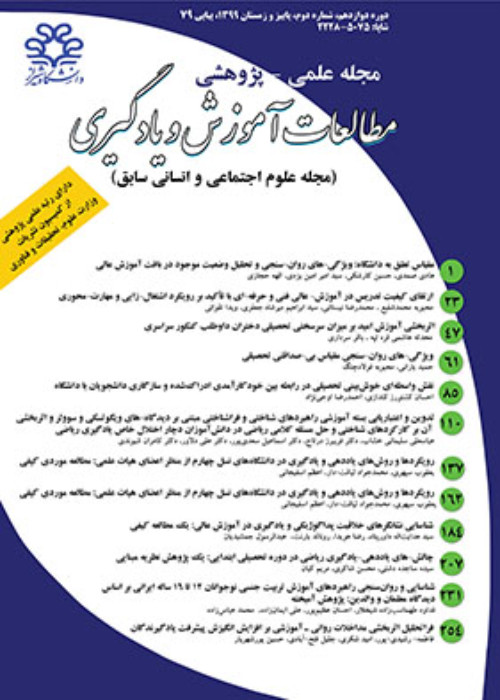A Study of the Relationships among Trainee's Individual Characteristics; and Reaction to Training and Post Training Self-Efficacy in Isfahan Gas Company
Author(s):
Abstract:
IntroductionAs organizations are experiencing rapid changes, such as competition in the global economy, the need for strategies to cope with these changes is crucial. Training as a systematic approach to learning is one of the most important strategies for organizations to enhance employees’ productivity and to gain new knowledge and skills needed to meet the challenges. In order to conduct effective training, training managers in organizations need to take into account many factors that are related to training outcomes. One of these factors is trainee’s individual characteristics. The main goal of this study was to determine whether trainees’ individual characteristics including motivation to learn, personality characteristics, age and education are able to predict training outcomes including reaction to training and post training self-efficacy.Research questionsTwo research questions guided this study: 1) Which of predictor variables including personality characteristics and motivation to learn do predict post training self-efficacy? 2) Which of predictor variables including personality characteristics, motivation to learn, age and education do predict reaction to training?MethodThe target population of this study was all employees of Isfahan Gas Company, male and female, who attended training programs during a 3-month period. The sample for the study was randomly selected through cluster sampling procedure, and comprised 109 employees of Isfahan Gas Company. The average age of participants was 38.80 years old. In terms of education, 2.80 percent had not completed high school, 20.20 percent had completed high school, 39.40 percent had some college course work, 33 percent had a bachelor’s degree and 4.60 had percent a master degree. The instruments of the research consisted of: 1) NEO Five Factors Inventory (NEO-FFI) which assessed personality characteristics including: neuroticism, extraversion, agreeableness, conscientiousness, and openness to experience.2) Reaction to training scale,3) Motivation to learn scale,4) Post training self-efficacy scale, and5) Demographic questionnaire. The data of the study were collected in two stages: before training and immediately after training. Before each training program, trainees received the first questionnaire which contained scales to measure personality characteristics, motivation to learn and demographic variables. Immediately after each training program, trainees completed the second questionnaire that assessed training outcomes, including reaction to training and post training self-efficacy. Psychometric characteristics including validity coefficients and Cronbach Alpha coefficients were calculated for the instruments. This study was conducted through correlation design. Pierson correlation coefficients and multiple regression analysis through enter method were used, to analyze date.ResultsThe results of calculation of correlation coefficients revealed that there was a meaningful and negative relationship between neuroticism and post training self-efficacy. These results also showed that there were meaningful and positive relationships among extraversion, agreeableness, and conscientiousness, as personality traits, and post training self-efficacy as a training outcome. However, no meaningful correlation between openness to experience and post training self-efficacy was found. Otherwise, there was a strong and positive relationship between motivation to learn and post training self-efficacy. It was also found that conscientiousness was the only personality characteristic that was positively and meaningfully related to reaction to training. There was also a positive and meaningful relationship among motivation to learn and education, and reaction to training. Moreover, these results showed there was a negative and meaningful relationship between age and reaction to training. To answer the research questions, multiple regression analysis revealed that four personality characteristics including, extraversion, neuroticism, conscientiousness, and agreeableness, and motivation to learn accounted 25 percent of the post training self-efficacy variance. However, the examination of the regression coefficients (s) showed that only motivation to learn can predict post training self-efficacy (=0.36, p<0.01). The results of multiple regression analysis also demonstrated that conscientiousness, motivation to learn, age and education accounted 27 percent of the reaction to training variance. In this case, the examination of the regression coefficients also revealed that only motivation to learn can predict reaction to training (=0.40, p<0.01). ConclusionTraining has been and will continue to be, a valuable tool for managing many current and future challenges. To enhance the return on training investment it is crucial to look beyond the classroom in order to understand how and why training works or does not work. This study highlighted the importance of several trainees’ individual characteristics in training process. Indeed, individual characteristics are one of the important factors that are related and predict training outcomes. This study extends our knowledge of the role of personality characteristics, motivation to learn and demographic variables to predict post training self-efficacy and reaction to training as two training outcomes. The most important finding of this research is the positive and meaningful relationship among motivation to learn as a trainee’s variable, and post training self-efficacy and reaction to training as training outcomes. That is the more people are motivated to learn before training, the more they likely experience high self-efficacy and positively react to training immediately after training. Therefore, one of this research’s implications is that motivation to learn is a determinant variable in training process. So motivation to learn deserves to be further investigated and assessed by training researchers and training evaluators in training settings.
Language:
Persian
Published:
Studies in Learning & Instruction, Volume:2 Issue: 2, 2012
Page:
57
magiran.com/p966159
دانلود و مطالعه متن این مقاله با یکی از روشهای زیر امکان پذیر است:
اشتراک شخصی
با عضویت و پرداخت آنلاین حق اشتراک یکساله به مبلغ 1,390,000ريال میتوانید 70 عنوان مطلب دانلود کنید!
اشتراک سازمانی
به کتابخانه دانشگاه یا محل کار خود پیشنهاد کنید تا اشتراک سازمانی این پایگاه را برای دسترسی نامحدود همه کاربران به متن مطالب تهیه نمایند!
توجه!
- حق عضویت دریافتی صرف حمایت از نشریات عضو و نگهداری، تکمیل و توسعه مگیران میشود.
- پرداخت حق اشتراک و دانلود مقالات اجازه بازنشر آن در سایر رسانههای چاپی و دیجیتال را به کاربر نمیدهد.
In order to view content subscription is required
Personal subscription
Subscribe magiran.com for 70 € euros via PayPal and download 70 articles during a year.
Organization subscription
Please contact us to subscribe your university or library for unlimited access!



